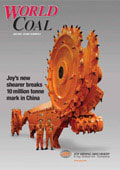Editorial comment
Moving with the times is hard; for many change is difficult to embrace, but lagging behind could be dangerous. In business this is certainly true. There is always the risk of losing your competitive edge, your unique selling point. As the times are moving a pace there is even more need to keep up. In the world of media the pressing question seems to be: ‘to tweet or not to tweet?’ This reference to the micro-blogging site Twitter may have had little relevance to the majority only a few months ago – but now that everyone seems to be using the site, it makes one wonder: is resistance futile?
Register for free »
Get started now for absolutely FREE, no credit card required.
Moving with the times is hard; for many change is difficult to embrace, but lagging behind could be dangerous. In business this is certainly true. There is always the risk of losing your competitive edge, your unique selling point. As the times are moving a pace there is even more need to keep up. In the world of media the pressing question seems to be: ‘to tweet or not to tweet?’ This reference to the micro-blogging site Twitter may have had little relevance to the majority only a few months ago – but now that everyone seems to be using the site, it makes one wonder: is resistance futile?
Change has been expedited by recent economic events, which have in turn altered priorities. As Luke Popovich of the NMA commented in this column last month, the US people have ranked the economy as a greater concern to them at the current time than the environment. Perhaps this could offer some breathing space for the coal industry then, allowing it to move lower down the international political agenda as world leaders seek to address the economic crisis?
Not so, because, as we know, the industry has not emerged from the economic crisis unscathed. Resisting the change associated with this fact would not only be futile, it would be suicidal. A company cannot drag its feet over economic concerns, and so, inline with the US people, it has to prioritise. Closures, or the selling of assets, will inevitably come higher on the list than ongoing R&D into emissions reduction.
Are we therefore in an era where addressing climate change is no longer important and the coal industry can function without constant scrutiny over its environmental implications? Again, not so. It is not just a case of moving with the times, but also keeping one step ahead, in order to influence future developments. Once the hailed upturn comes, climate change will race back up the agenda. The coal industry will need to be prepared. Thus we watch with interest as the US attempts to put a cap-and-trade system in place before Copenhagen in December. Why is this so important? Because in order to have any clout at the meeting, the US needs to be seen to be moving with the times, so that it can show other developing nations the way. Resistance is now futile: cap-and-trade, CCS, and other new technologies are a sign of the times, and they should be embraced in order for the industry to move forward.

